Mary Kingswood's Blog, page 15
May 29, 2023
Review: The Perfect Rake by Anne Gracie (2005)
 This is one of those books that could have been a five star read, but it had weaknesses that I just couldn’t get past – too much random violence, too many clichés, too much contrariness in the heroine, too much plot manipulation on the author’s part and too detached from real life in general. But oh, the hero! A confirmed rake who falls instantly for the heroine and doesn’t swerve from that for one single second – oh, yes, yes, yes! It was Gideon alone who saved this book from three-star ignominy, and near as dammit yanked it all the way up to five stars, too. Lovely, lovely Gideon.
This is one of those books that could have been a five star read, but it had weaknesses that I just couldn’t get past – too much random violence, too many clichés, too much contrariness in the heroine, too much plot manipulation on the author’s part and too detached from real life in general. But oh, the hero! A confirmed rake who falls instantly for the heroine and doesn’t swerve from that for one single second – oh, yes, yes, yes! It was Gideon alone who saved this book from three-star ignominy, and near as dammit yanked it all the way up to five stars, too. Lovely, lovely Gideon.Here’s the premise: the Merridew sisters, aged from twenty down to ten, are living with Grandpapa after their parents died. From an idyllic life of sunshine and laughter in Italy, they’re now living a miserable and reclusive existence in the English countryside, being regularly beaten for the least transgression. Yes, this is one of those tales where the villain is excessively villainous. But when Grandpapa has a fall and is laid up in bed for a while, they take the opportunity to escape to his brother, Great-uncle Oswald, a kindly soul who lives in London.
Fortuitously, he agrees to clothe them fashionably and bring them all out, but he won’t release the beautiful younger sisters onto the world until plain eldest sister Prudence is safely betrothed. Happily, Prudence is, in fact, betrothed to Phillip Otterbury, who has been in India for four years and will come back eventually to marry her, she’s sure. But she can’t tell Great-uncle Oswald about Phillip (because reasons) so she invents a betrothal to the famously reclusive Duke of Dinstable, who lives safely far away in the wilds of Scotland. But it turns out that he’s actually in town for once, and Great-uncle Oswald is determined to go and talk to him. There’s only one thing to be done – Prudence must go and talk to him first.
And then follows one of the funniest scenes I’ve ever read, when she thinks she’s meeting the duke, but it turns out to be his rakish cousin, Lord Carradice — our hero, Gideon — who rakishly falls for Prudence, and turns his rakish attention on her. And of course she can’t help responding to all that rakish charm, only partially mitigated by the inhibiting factor of the fiancé in India. So there’s a lot of kissing and unaccustomed warmth in strange places (yes, this is not a sex-free read), followed by biffing him over the head with her reticule.
And this is basically the whole of the romance part of the plot – Gideon pursues her with single-minded determination, and a degree of charm which any normal woman would find irresistible. I certainly did, and reading the reviews, I see I’m not alone. But Prudence made a solemn vow to Phillip four years ago, and carries his ring on a chain around her neck. So even though she’s drawn to Gideon, and kisses him back with equal fervour, she’s sure he’s just fooling around with her – being a rake, basically.
This is possibly the most annoying part of the whole book. Prudence, being a sensible girl and not the flighty type, really ought to make up her mind – either surrender to that rakish charm and enjoy all those deliciously rakish kisses and unexpected warmth, or else remember her solemn vow to the absent Mr Otterbury and hold herself aloof from the kisses, warmth, etc. One kiss I can allow, since she was taken by surprise, but after that, she really has to make her mind up. But she never does, berating Gideon repeatedly for forgetting about her betrothal, while giving every sign of having forgotten it herself.
Gideon, meanwhile, is slowly and almost imperceptibly melting from irredeemable rake to utterly faithful and adoring lover, who will do anything at all for his lady. It takes him a long time to realise it, but he gets there in the end, and honestly, by the point in the book where villainous Grandpapa turns up again and Gideon swears a solemn oath to protect Prudence and her sisters from him, he is absolutely irresistible, and it makes no sense to me that Prudence doesn’t simply dispense with the absent Mr Otterwhatsit instantly.
But, for tedious plot reasons, she doesn’t, and so the book veers somewhat off the rails in the later stages. There’s rather a lot of plot manipulation going on, not least that ring that Prudence always wears on a chain around her neck, except for that one convenient time when she doesn’t. And the sisters’ sojourn in Bath is replete with coincidental meetings, and some very over-the-top melodrama. It all got a bit silly.
Happily all comes right in the end, naturally. Be warned that there is a fair bit of bedroom stuff going on by this time, so if that’s not your thing, avoid. And I have to say, I wasn’t a fan of the punishment meted out to poor Mr Otterclogs (so many delicious variations on the name!) – having been on the wrong side of unwarranted violence themselves, why inflict it on anyone else? And to treat it as a joke is out of keeping with the seriousness of what was done to the sisters.
However, this is not a book that intends to take itself seriously. It’s all a bit fairytale-ish, with a cartoonishly villainous villain, a series of spectacularly beautiful heroines (apart from Prudence) and a whole heap of implausibilities. But Gideon… Gideon totally saves the book from any hint of mediocrity. He has all the best lines, all the best moves and all the emotional moments. I honestly don’t know how Prudence could resist him for as long as she did. He may (or may not) be the perfect rake, but he is certainly the perfect hero. I recommend this book for Gideon alone. Four stars.
Review: King George’s Man by Jayne Davis (2023)
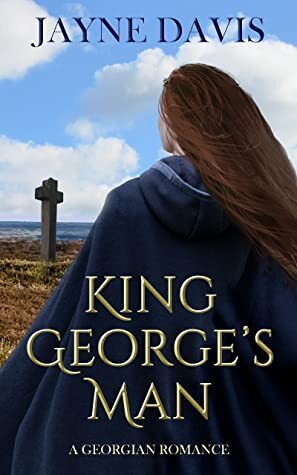 Jayne Davis is one of the most reliable of the new school of historical romance authors, not because she writes the familiar themes repeatedly but precisely the opposite. She’s not afraid to step off the well-trodden paths and set her characters firmly down in unusual territory – the pre-Regency Georgian era, for one thing, far-flung parts of the British Isles for another, and the hard-working middle and lower classes. As a consequence, her books are always fascinating, and this is just the latest example.
Jayne Davis is one of the most reliable of the new school of historical romance authors, not because she writes the familiar themes repeatedly but precisely the opposite. She’s not afraid to step off the well-trodden paths and set her characters firmly down in unusual territory – the pre-Regency Georgian era, for one thing, far-flung parts of the British Isles for another, and the hard-working middle and lower classes. As a consequence, her books are always fascinating, and this is just the latest example.
Here’s the premise: Nell Mason has fallen on hard times. Her father’s bank failed, and when he died, she and her mother were forced to turn to her uncle, running a shady inn on the Yorkshire moors. Her mother is now dead, too, but Nell is still there, working as an unpaid skivvy in the kitchen, keeping her head down to avoid her uncle’s cruelty. She’d love to leave, but the occasional coin she gets as a tip isn’t enough to risk it, and where would she go anyway? She knows her uncle’s up to some nefarious business, but there’s not much she can do about that, either.
Into this difficult situation comes a man who could bring her a great deal of trouble. Lieutenant Toby Bourne is on leave from the army before a posting to the Colonies, and he’s recruited to investigate a highway robbery, which leads him to the lonely inn. He soon realises that Nell is not the usual lowly inn worker, and draws her into his plans. She finds herself having to take unusual risks, pitting herself against not just the highwayman but also her own uncle.
So the adventure unfolds, and to be frank, there’s a lot more adventure than romance. Toby and Nell are on good terms fairly quickly, but the drama rather overshadows the gradual development of their feelings. I can’t say the balance was wrong, because the fallout from the robbery is dramatic enough to justify the attention paid to it, but the romance was just a tad low-key for my liking. Even very late in the day, when Toby finally gets round to proposing, they’re both still uncertain about the depth of their feelings. Luckily, they’re both sensible enough to talk things through, so there are no last-minute misunderstandings. And I very much liked the pragmatic way Nell decided their future. It wasn’t the outcome I’d been expecting, but it was perfectly in keeping with their characters. And I loved the mini-epilogue right at the end, summarising a lot of history in one newspaper announcement (and complete with authentic-looking ‘s’ shaped like ‘f’ – a delightful touch!).
I haven’t said much about the adventure, because I don’t want to spoil the plot for anyone, but it’s all very nicely done. Along the way, there are people who both help and hinder Nell and Toby, whether through wickedness or silliness, but they were always fully rounded and believable characters. I actually felt sorry for Miss Delaney, the epitome of silliness, who should have been better protected by her parents, and there were some lovely side characters, like Aunt Em and the magistrate. Naturally, being Jayne Davis, there’s not a single whisper of an anachronism, and the writing is well up to her usual standard.
A lovely, lovely story about ordinary people caught up in difficult circumstances, yet always behaving with honour and dignity, and a fine, low-key romance. Five stars.
April 27, 2023
Review: Eagleton by Jenny Hambly (2023)
 Jenny Hambly is one of my must-read authors, and this book was another excellent addition to her repertoire, to round off the Confirmed Bachelors series. The distinguishing characteristic of this one is the setting – most of the book is well beyond the usual run of Regency backdrops, being set on the shores of Lake Garda, and I can’t tell you how refreshing it was to be somewhere so unusual. If you’ve been to Italy it will bring back memories, and if you haven’t, you’ll be able to imagine it.
Jenny Hambly is one of my must-read authors, and this book was another excellent addition to her repertoire, to round off the Confirmed Bachelors series. The distinguishing characteristic of this one is the setting – most of the book is well beyond the usual run of Regency backdrops, being set on the shores of Lake Garda, and I can’t tell you how refreshing it was to be somewhere so unusual. If you’ve been to Italy it will bring back memories, and if you haven’t, you’ll be able to imagine it.Here’s the premise: Alexander, the Marquess of Eagleton, travels to Italy with his baby daughter to reunite with a lost part of his family. Nell is escaping from her family. Both of them will have to come to terms with their past histories in order to forge a future together. And right there is my sole grumble with this book – there is a LOT of backstory to be explained. Both hero and heroine have deeply tortured pasts and even the minor characters have their own tragedies and family feuds to overcome.
It all serves to make the story a bit top heavy, and the early chapters in particular are bogged down in explanations. Sometimes it almost felt that I’d missed an earlier book (and actually part of Lord Eagleton’s may have been in Ormsley). Personally, I prefer all the history to be dripped in gently rather than as a torrent, but it does serve to underscore just why these two are so slow to trust, and why they’re liable to lash out at each other. There are a lot of missteps along the way as they snipe at each other, and then completely fail to make allowances.
But once the story gets going, it becomes compelling reading, and not just for the romance. The Italian setting is a big part of the magic of the book, especially the lake itself, the grape harvest and later the lovely city of Verona. It’s painted with an artist’s eye for detail, such as the door knockers, the amphitheatre and the odd fact that boats tend to ply the lake at night (why, I wonder?).
While some elements of the past are laid to rest with surprising ease, the last few chapters see some startling and dramatic developments which I definitely did not see coming. One thing I particularly enjoyed in this book is that several of the apparently villainous characters turned out to be far more complex that they seemed at first sight. I love it when a little twist makes the reader see a character in a completely different light. This is how people really are, not the rigid black and white so often seen in fiction.
Needless to say, everything is resolved satisfactorily at the end, and hero and heroine reach their happy ending in resounding style. This is another fine work by the author, and only the weight of all that backstory keeps it to fours stars for me.
Review: The Country Gentleman by Dinah Dean (1986)
 This is another author who published Regencies back in the day, now being republished in ebook form with new covers. I’ve not encountered this author before, but I absolutely adored this book. It has a charming rural setting, a mysterious (but not too threatening) hero, a downtrodden and thoroughly deserving heroine, and a romance that builds slowly over the course of the book. And no pesky anachronisms (that I spotted).
This is another author who published Regencies back in the day, now being republished in ebook form with new covers. I’ve not encountered this author before, but I absolutely adored this book. It has a charming rural setting, a mysterious (but not too threatening) hero, a downtrodden and thoroughly deserving heroine, and a romance that builds slowly over the course of the book. And no pesky anachronisms (that I spotted).Here’s the premise: Miss Lucinda Calvert is the daughter of her somewhat disorganised and short-sighted rector father and her ailing mother, leaving her the mainstay of the village, constantly busy about her charitable works for the poor. There are few people her own age in the village, apart from one female friend, the curate and a French emigre, so she looks set to drift into spinsterhood. But the arrival of mysterious Mr John Harris at the long neglected estate of the Pinnacles sets her life on a different course. John is charmingly attractive, and soon shows that he enjoys her company, but he’s oddly reserved about his past. He’s been abroad, but where? And when? And more to the point, why? Questions are gently deflected, but Lucinda soon discovers evidence that he’s not all he seems. Yet he’s so attractive…
The romance is lovely, and quite unusual for the era it was written in, which more usually follows the Georgette Heyer policy of wrapping the romance up with a kiss on the final page. Here Lucinda very gradually find herself falling for the hero, and although we never get John’s point of view directly, it’s obvious that he’s following the same path, firstly paying equal attention to Lucinda’s friend and then over many chapters diverting his attention solely towards Lucinda. I loved the way this was done, and of course, Lucinda is very torn because she is aware of all John’s suspicious activities too, so there’s a little tension (but not very much, it had to be said, since the resolution of the mystery was blindingly obvious almost from the first moment).
There is a minor romance for Lucinda’s friend, too, although I was a bit shocked by the speedy, not to say perfunctory, way in which the last vestige of an obstacle was swept away. To be honest, it was hard to see why there was ever an obstacle at all.
But really, one of the great attractions of this book, for me, is in the wonderful depiction of village life. It’s all in the details, like the cats, and the milk turning in the hot weather, and the lyrical description of some of the walks Lucinda went on. And I loved that the sexton doubled up as coachman and even butler for the rector’s family when required.
The ending was a little too glib (didn’t John have to at least consult his father before proposing?), but I’m not going to complain because otherwise this book was well-nigh perfect. Highly recommended. Five stars.
Review: Minta in Spite of Herself by Christina Dudley (2023)
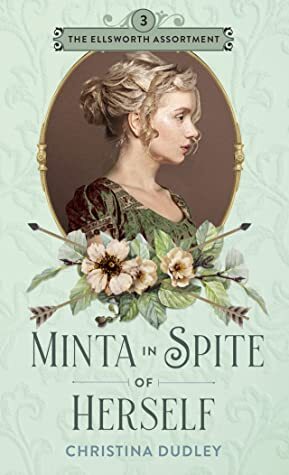 Every Christina Dudley book is a joy to read, and this is no exception. I’ve been looking forward to Minta’s story since she first appeared in the background of her eldest sister’s story, shooting arrows with her bosom friend Aggie, and generally getting up to all sorts of hoydenish mayhem. How was she ever going to turn into a heroine? I couldn’t wait to find out.
Every Christina Dudley book is a joy to read, and this is no exception. I’ve been looking forward to Minta’s story since she first appeared in the background of her eldest sister’s story, shooting arrows with her bosom friend Aggie, and generally getting up to all sorts of hoydenish mayhem. How was she ever going to turn into a heroine? I couldn’t wait to find out.
Here’s the premise: Minta’s best friend Aggie has traitorously fallen for rakish Francis Taplin, but Minta knows he’s only looking to restore the family’s fortunes after his own expensive lifestyle has brought them perilously close to ruin. How can she save Aggie from him? She turns to Francis’s friendly stepbrother, Nicholas Carlisle, for aid. Between them, they come up with a cunning plan — Minta will turn herself into the sort of young lady that will draw Francis’s attention away from Aggie. When that fails to distract him sufficiently, they use his rivalry with Nicholas to good effect – Nicholas will pretend to court Minta. But Minta hasn’t taken into account that her efforts will look like the ultimate betrayal to Aggie, and neither of them have considered how hard it will be to maintain a pretend courtship that they’d both like to be real. Especially when they can’t tell each other the truth.
Dudley specialises in these complicated webs of deceit, but she does it so cleverly and then untangles them so elegantly that the reader can only watch in admiration. I love the humour, too, which often made me laugh out loud, especially Minta wrestling with The Bosom. And yet there are tiny vignettes that are so moving they make me want to cry. Minta’s newest stepmother, for instance, who reads the proposal letter from Nicholas to Minta, and is swept with emotion because she, for many years a spinster and then with a very pragmatic marriage of convenience, has never received anything one tenth as romantic.
Of course, everything sorts itself out in the end, and nobody does anything wildly stupid. I was rather amused by Francis’s solution to his trials, Minta and Nicholas get their happy ending, and both Tyrone and little sister Bea became more interesting in this book. I see that Tyrone is next up for a romance, and perhaps we’ll see Bea in a starring role after that.
Some quotes that caught my eye:
‘Great guns! Where did Aggie get that bosom? Has she had it all along?’
‘Minta, you look like you were drowned and then murdered.’
‘Not everything is a love story.’ ‘That only means you have not read to the end.’
A terrific book on a multitude of levels. I highly recommend it, but if you’re new to the author, start with The Naturalist and enjoy her entire repertoire. Five stars.
April 11, 2023
Waltzing Widow by Joan Smith (1991)
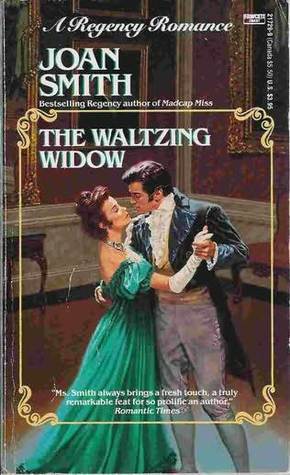 My second Joan Smith on the trot and I’m finding that my palate soon becomes jaded. They are very samey, and for those looking solely for the froth of a light-hearted Heyer-esque romp, this is just the ticket, but after a while I begin to long for a bit of character development. In this one, the misunderstandings all became a bit too tangled and I just wanted it all to stop.
My second Joan Smith on the trot and I’m finding that my palate soon becomes jaded. They are very samey, and for those looking solely for the froth of a light-hearted Heyer-esque romp, this is just the ticket, but after a while I begin to long for a bit of character development. In this one, the misunderstandings all became a bit too tangled and I just wanted it all to stop.
Here’s the premise: Lucy Percy was almost taken in by a fortune hunter during the season in London. To allow herself time to recover, she and her aunt rent a cottage in the countryside. To deter unwanted suitors, Lucy pretends to be married and her widowed aunt pretends to be a spinster, and of course this is going to lead to huge problems. It so happens that the cottage is owned by a baron, Lord Bigelow, who decides that Lucy is just his sort of lady – what a pity she’s married. She instantly decides that being married is a hindrance to her ultimate objective, which is to find a husband of the non-fortune-hunting variety, so she summarily bumps off her supposed husband and makes herself a widow. Lord Bigelow is thrilled, and thinks it’s just a misunderstanding that he thought her husband was alive.
Meanwhile, Lord Bigelow’s uncle, the Earl of Avedon, is much more suspicious, and thinks Lucy is herself a fortune hunter. He’s a bit confused, because both she and the aunt are clearly well-bred, but he’s quite sure she’s a retired courtesan or actress, out to snabble a rich husband. He sets out on a campaign to get rid of Lucy and her aunt by forcing them out of the cottage. Being the principal landowner in the district, he decides to do some road ‘improvements’ around their cottage, effectively cutting them off from food supplies and company. Lucy isn’t about to surrender so tamely, however, so she and her aunt ingeniously work around the problem (and frankly, it’s hard to see how digging up the road would stop the butcher’s boy, say, from walking over the fields to deliver their leg of lamb; everybody walked everywhere in those days).
And so it goes on, the two of them fighting tooth and nail, she always having the upper hand and he, the prim and proper gentleman, finally unravelling in spectacular style. As always with Joan Smith, the romance takes a back seat to all the banter and shenanigans, and there isn’t even a particularly romantic denouement at the end. And as I mentioned before, the whole thing became tediously complicated. I eventually gave up trying to work out who knew what, and whether it was true or not. It was just too much work. Lots of fun between the complications, though, and although it wasn’t altogether to my taste, I enjoyed it well enough for four stars.
Country Flirt by Joan Smith (1987)
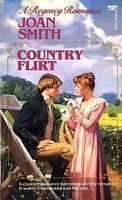 This was a barrel of laughs, and although the hero and heroine get themselves into a rare old muddle through sheer stupidity, and some of the characters are a bit over the top, it’s all so funny that it doesn’t really matter.
This was a barrel of laughs, and although the hero and heroine get themselves into a rare old muddle through sheer stupidity, and some of the characters are a bit over the top, it’s all so funny that it doesn’t really matter.
Here’s the premise: Samantha Bright has been buried in the country her whole life, and has reached the ripe old age of twenty-six without finding a husband. Part of the problem is that she’s been in love with her neighbour Lord Monteith for years, even though he treats her with negligent familiarity, calling her his country flirt – when he’s even at home, that is, which isn’t often. One day Monteith will marry, he supposes, but not yet, and until then he’s enjoying himself thoroughly, while Sam is languishing into spinsterhood. But into this stasis comes Monteith’s uncle, Lord Howard, who returns home from India with a million pounds in his pocket, determined to marry and sets his sights on Sam. Which of course serves to focus Monteith’s attention properly on her for the first time.
From here on, the plot follows a fairly predictable path. There are some side distractions, like Mrs Armstrong, the retired courtesan that Howard wants to set up as his mistress, but she’s angling for marriage, and Clifford Sutton, the low-key friend and possible suitor of Monteith’s mother, who is herself a central character, constantly manipulating everyone around her in the most outrageous fashion. But Lord Howard is the character who dominates the stage in every scene, completely upstaging the two principals, who seem drab and spiritless by comparison.
I confess to being puzzled by the titles. It’s never mentioned what Monteith’s exact rank is, but since his uncle is Lord Howard, he can only be a duke or a marquess, and since nobody your-graces him, he must be a marquess. Which is pretty high up the pecking order, but no one ever refers to it, or treats the family with the sort of deference that a marquessate would usually engender. Nothing wrong with that, it just struck me as odd. There was one historical misstep – not impossible but something that would have been frowned upon. I don’t want to be too spoilerish, so I’ll just say – marriage to deceased wife’s sister.
This is not the book to read if you want deep character development or oodles of angst, with emotion spilt all over the page. It’s written in the classic tradition of Heyer-esque Regency romps, all froth and silliness, no unseemly lusting, and the headline romance is wrapped up on the last page with the hero sweeping the heroine into his manly arms for a thorough kissing. Although to be fair, there is a sort of an epilogue here.
It’s also not the book to read if you’re a stickler for period-accuracy language, and don’t get me started on the punctuation. If this book has ever seen a proofreader, he or she should be fired immediately. Much of it reads as if it was transcribed from a printed version by optical character recognition, and then simply published. Not good enough. But it’s very funny, and I can forgive a book a great deal if it makes me laugh. The conversations between Sam and Monty, especially in the beginning, before he gets all grumpy and jealous, are hilarious. But there are just too many misunderstandings, and too many errors to give it more than four stars.
The Independent Heiress by Elizabeth Bramwell (2019)
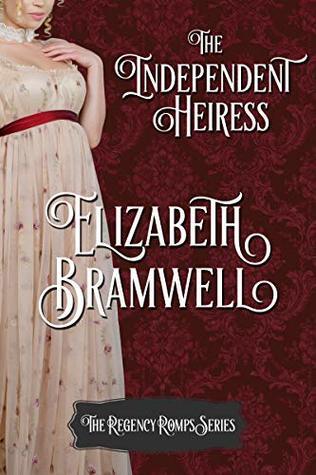 I read one of Elizabeth Bramwell’s books quite a while ago, and enjoyed it, so I don’t quite know why it’s taken me so long to read another but there we are. This was recommended to me as being a light read, and so it is, and very enjoyable too.
I read one of Elizabeth Bramwell’s books quite a while ago, and enjoyed it, so I don’t quite know why it’s taken me so long to read another but there we are. This was recommended to me as being a light read, and so it is, and very enjoyable too.
Here’s the premise: Lydia Meadows has no desire to marry, and have her husband take everything she owns. Instead, as her father’s sole heir, she’s going to help him manage his various business interests, and perhaps develop a few businesses of her own, too. Her father recognises her talent and encourages her in that direction. And since she’s far taller than the average woman, she’s unlikely to find a husband anyway.
But then Lord Standish intrudes into her orderly existence by falling from his horse during a hunt. Lydia helps to rescue him, and this throws the two together. For his part, William has no intention of marrying, either. Some day, maybe, because as the only son it’s his duty, but surely not yet? But as they gradually learn more about each other and begin, perhaps grudgingly to develop some respect for each other, they realise that they are as alike as chalk and cheese. She is practical and competent to her core, but with a brisk, businesslike manner that may be successful in making deals but doesn’t work socially, while he is the easy-going social animal, who couldn’t organise his way out of a paper bag. And when he tries to prove his ability to manage his own affairs, everything goes horribly wrong. In some ways, they are ideally suited, but are they too unalike to make a match of it?
Well, we know the answer, of course, but watching them reach that point themselves is a delight. I liked the way William learnt to use his injured leg to his own advantage, when it suited him, and I thoroughly enjoyed his inventive ways of dealing with unwanted attentions from young ladies eager to be led to the altar. But along the way, he also learns what it’s like to be confined to the wallflower benches, and discovers that even wallflowers have strong and interesting personalities. It’s not uncommon to see a wallflower become the heroine of a Regency, but it’s unusual to see the plight of them as a group in this way. An interesting insight into Regency life.
The author brings the romance to fruition with a sure hand. I loved that William is attracted to his goddess, and charmingly calls her Artemis, almost from the start, and never wavers in that. I do like a hero who listens to his heart and understands what love is, instead of having it creep up on him as a huge surprise in the final chapter. There are some oddities of language – lived experience? Learning curve? But otherwise nothing horrible tripped me up, and this was a good four stars.
Review: Battling The Bluestocking by Martha Keyes (2023)
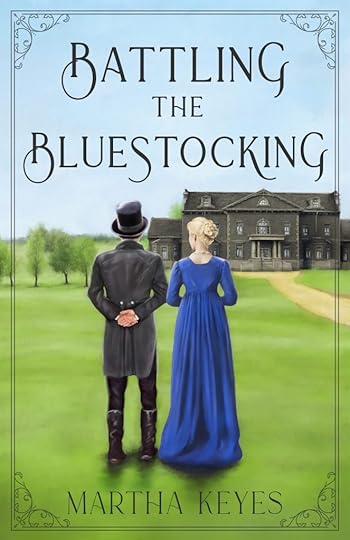 I was a bit nervous about reading this because I’ve loved the previous books in the series, and yet this one has one feature that put me off — it’s built around a discussion of Jane Austen’s books. I can’t tell you how tired I am of authors who wheel out Austen’s books in Regencies in a sly (and frankly lazy) nudge to modern readers. However, I should have known that Martha Keyes is cleverer than that, because here Austen’s books are held up as exemplars of the despised novel, and contrasted with the more worthwhile intellectual endeavour of ancient Greek and other classic works. And even if both hero and heroine do come to see the value in Austen, there’s enough debate on other topics here that the book’s theme of reason versus emotion is beautifully illustrated. The hero and heroine play intellectual pingpong over classical works, but when they come to debate the Austen classics, they find themselves drawn into discussing their own feelings in a way that leaves them wide open to falling in love.
I was a bit nervous about reading this because I’ve loved the previous books in the series, and yet this one has one feature that put me off — it’s built around a discussion of Jane Austen’s books. I can’t tell you how tired I am of authors who wheel out Austen’s books in Regencies in a sly (and frankly lazy) nudge to modern readers. However, I should have known that Martha Keyes is cleverer than that, because here Austen’s books are held up as exemplars of the despised novel, and contrasted with the more worthwhile intellectual endeavour of ancient Greek and other classic works. And even if both hero and heroine do come to see the value in Austen, there’s enough debate on other topics here that the book’s theme of reason versus emotion is beautifully illustrated. The hero and heroine play intellectual pingpong over classical works, but when they come to debate the Austen classics, they find themselves drawn into discussing their own feelings in a way that leaves them wide open to falling in love.
Here’s the premise: Phineas Donovan is the intellectual of the family, always with his nose in a book. He’s a bit nervous about taking up a position as tutor to an earl’s son, but how hard can it be? He soon finds he has to be a bit creative about lessons for young George (who sounds a bit dyslexic, perhaps?), but the biggest difficulty is the overt hostility of George’s older sister, Lady Sarah Danneville. But she’s a bluestocking, so she likes books just as much as Phineas does, and the two are soon sparring over works of ancient Greek, and then challenging each other to read samples of the despised romantic novel.
The plot unrolls fairly predictably from here on, as the two gradually learn to appreciate each other’s minds and bodies in equal measure. But Lady Sarah is the daughter of an earl and Phineas is the younger son of an admiral, with neither an independent fortune or a proper career. He’s a tutor with a curacy at the local church, so any match between them is unthinkable – isn’t it?
And here’s where Sarah does the stupid heroine thing, in deciding that she can’t possibly have Phineas so she’ll marry the exact opposite – an older man who already has an heir, so she’ll still have the freedom to be herself and not be tied to the domestic sphere. And her parents have found the very man, so how can she refuse? Oh dear.
Needless to say, things get sorted out in the end, although frankly the ending was a bit soggy, when everyone magically falls into line, and there’s one situation that I strongly disliked. I know it’s meant to be cute and all, but I positively hate it when deceit, even when it’s kindly meant, is practised on one of the main characters. Just be honest and reveal the good news straight away, instead of allowing that character to wallow in misery a moment longer than necessary. And the epilogue was just too sweet for my tastebuds. I know lots of readers love schmaltzy epilogues, but I’m not one of them.
Some other issues that got between me and wholehearted enjoyment of this particular book. I’m really not a fan of the duel viewpoint first person narration. When every paragraph is ‘I did this and that…’, it becomes hard to know which I is being spoken of, and yes, I know every chapter is headed with the appropriate character name, and it’s entirely my own fault for not reading the headings but I don’t, and so I regularly have to do a double-take to work out whose head we’re in. Mea culpa.
The other big issue with this book is the sheer volume of Americanisms peppering it. I’ve never noticed this in Martha’s books before, apart from the odd one or two, but here they’re everywhere, including pinkies, off of, write someone, go do something and absent used as a preposition. And shall absolutely everywhere. Does it matter? Of course not, and 99% of readers won’t even notice, but I do, and it makes it difficult to immerse myself fully in the story. It’s particularly disappointing when the author’s evocation of the Regency era is so magnificent in every other respect.
But in every other way, this book is well up to the author’s usual standards. Both Phineas and Sarah are well-drawn and fully-rounded characters, their relationship develops slowly and believably, and it’s easy to root for them. The dialogue is so satisfyingly sparky between them, and the author manages something that so few others achieve – her intellectual characters are genuinely knowledgeable and quick-witted. So many authors tell us their characters are clever, but very few manage to show it as well as is done here.
Martha Keyes is a brilliant writer and I highly recommend all her books, but for me those Americanisms and the slightly soggy ending keep it to four stars this time.
March 27, 2023
Review: Child of Summer by A T Abbott (2022)
This is a most unusual book – one with no reviews or ratings on Amazon or Goodreads (at the time I read it). That means it’s a complete blank slate, and I have no idea what to expect. But the blurb is intriguing and the cover is lovely (and most unusual) so I’ll give it a go.
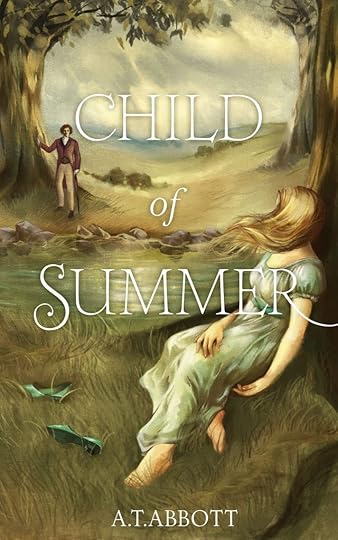 Almost at once, there’s a problem. The hero, Robert, Viscount Childes, attends a ball. He’s engaged, but he appears to be having a sexual relationship with his future wife, even though he plans to take a trip to India before the wedding, a journey of at least a year. What on earth is she supposed to do if she falls pregnant, and he’s on the other side of the world? Yet he seems quite pleased with himself, and his pal thinks he’s a bit of a lad. I can’t imagine any Regency gentleman with pretensions to honourable behaviour acting that way, yet we’re told throughout the book how honourable he is.
Almost at once, there’s a problem. The hero, Robert, Viscount Childes, attends a ball. He’s engaged, but he appears to be having a sexual relationship with his future wife, even though he plans to take a trip to India before the wedding, a journey of at least a year. What on earth is she supposed to do if she falls pregnant, and he’s on the other side of the world? Yet he seems quite pleased with himself, and his pal thinks he’s a bit of a lad. I can’t imagine any Regency gentleman with pretensions to honourable behaviour acting that way, yet we’re told throughout the book how honourable he is.
However, off he goes to India, whereupon the neglected lady promptly jilts him and marries someone else (because she was pregnant? We’re not told, but I wouldn’t be surprised). Four years later he returns, now bumped up in rank to the Earl of Hartfield since his father’s death, and attends the same ball and sees a lady there he danced with four years ago, Eveline Parish. Then she was lively and friendly; now she’s cold and distant. There was some scandal about her, but he doesn’t know what. Whatever could have caused such a great change in her?
When Rob bumps into her (literally) she’s being verbally set upon by a group of women, including Rob’s former betrothed. Rob rescues her, but she’s offhand with him. He’s intrigued by her, and sets out to befriend her, even though he doesn’t really know what the scandal is surrounding her. This doesn’t go too well, and ends up with Evie being on the receiving end of even more abuse from women. Whatever did she do?
And all the while, Rob and Evie are drawn to each other and very rapidly falling in love – or rather in lust, because this is not a sex-free read. There are some surprisingly passionate kisses early on, with the inevitable effects, and later in the book there are some long-drawn-out graphic sex scenes, which I confess I skipped over. There’s also a fair amount of robust language, of anachronistic forthrightness, including the f-word. We’re definitely not in Kansas here. I don’t mind that, although it does knock me right out of any semblance of Regency atmosphere, especially when it’s the ladies running around shouting ‘Bollocks!’.
What I did mind, very much, was the title errors. It’s not that there was much that was outright wrong, exactly, just that it was confusing. I spent quite a lot of time trying to work out exactly why Evie’s mother is Lady Eugenia, especially as her brother is Sir Elias Stone. That’s not impossible, but it’s very, very odd. Titles like Lady Eugenia, Lord Edward and Lady Jane are not simply polite forms of address to the upper classes, they actually mean something. Only the daughter of a duke, marquess or earl can call herself Lady Eugenia. Only the younger son of a duke or marquess can call himself Lord Edward, and since he’s the son of an earl, his correct title is the Honourable Edward Ainsley. And ‘Lady Jane’ is the Dowager Countess, so her correct title is Lady Highfield.
However, most readers won’t notice any of that, or the plethora of Americanisms, because after a moderately slow start, things ramp up pretty fast in the second half of the book, and this is where the author’s talent absolutely shines through. When it comes to emotionally fraught interchanges, I’d say she’s almost up there with Mary Balogh (and that’s high praise indeed). The whole story of Evie’s disgrace is gradually unravelled and dealt with, and although the method of dealing with it is fairly melodramatic, it had me cheering, I can tell you.
There are no other books listed under the author’s name, so I’m going to assume it’s her first published work. As such, it shows a great deal of promise. However, the plot is a little uneven, with long, rather dull spells punctuated by high drama, and I wasn’t enamoured of the amount of lusting the main characters got up to from the start. I strongly disliked the hero’s shaky morality both towards his original fiancee and later towards Evie, especially given her history. A Regency gentleman is supposed to treat a lady with the greatest respect, and his condemnation of his brother for very similar behaviour smacks of hypocrisy. As for Evie, I wasn’t convinced that she would behave that way after her previous experience. I wondered why her previous disgrace was such a secret; it was so dreadful that she was supposedly permanently ruined, yet no one seemed to know exactly what had happened (or at least no one told Rob). That seemed odd. I would also have liked to know a bit more about the former fiancee, and what happened to her after Rob left her to go jauntering around the world.
Despite these minor issues, the strong emotional scenes stand out, and I adored the discussion about Cicero – I love a heroine who can hold her own in an intellectual discussion, and I applaud the author for stepping off the well-trodden path (if I never see another sly reference to Jane Austen in a Regency romance, I’ll be very pleased). These are the sort of little details that make a book memorable, for me. I’d be happy to read more by this author. In a more established author, the title errors and the odd behaviour of both hero and heroine would keep this to three stars, but I’m always prepared to give a debut the benefit of the doubt, and those emotional scenes packed a big punch, so I’ll settle for four stars.



